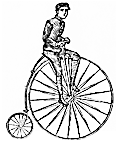Peace Statue
North of the Statehouse stands a winged female figure clad in flowing garments holding aloft the universal symbol of peace, an olive branch. This is The Peace Statue. Erected just after the end of WWI, the monument was intended to honor those who serving in the Civil War.
The Women's Relief Corps, the auxiliary of the largest and most influential Civil War veteran's organization, the Grand Army of the Republic (GAR), commissioned the statue from Bruce Wilder Saville, a faculty member at Ohio State University. The statue was unveiled in 1923, and in honoring those who served in war, it was also designed to recognize the contributions made by those folks left behind while they were away from home.
The inscription reads:
PEACE
Commemorating the heroic sacrifices of Ohio's Soldiers of the Civil War 1861 - 65 and the loyal women of that period
Erected by the Woman's Relief Corps Department of Ohio
1923
 Victorious Soldier at the Ohio Historical Center
Victorious Soldier at the Ohio Historical Center
Mr. Saville also created the large bronze "Victorious Soldier" sculpture now on display at the Ohio Historical Center in Columbus. The statue was originally part of the War Memorial Wing of the old State Museum on the campus of Ohio State University. Saville's $50,000 contract included the statue and 4 bas-relief panels in the museum wing.
In the late 60s, there was a lot of unrest on the Ohio State University campus, and anti-war sentiments were running high. It was suggested that this statue might be better suited elsewhere than on campus. In August 1970, the statue was moved and placed atop the dome of the Ohio Historical Center. In 1991, the statue was moved again, this time at the entrance of the Ohio Historical Center.
Harold Sands, a returning veteran of the Great War, was studying architecture at Ohio State University when Bruce Saville asked to him to help out with the statue. He still owned his World War I helmet, and Mr. Saville used that helmet in the casting of the Victorious Soldier.
Among the most prominent features of the Ohio Statehouse and Capitol Square is the symbolism found in the historic statues, monuments and markers expressing the ways different generations of Ohioans have understood their history and own experiences, and how they wished to be remembered.
Statehouse Statues
Surrounding the Ohio Statehouse are numerous statues and monuments. As part of a new program, you can telephone the statues and they will tell you in some detail about the subject. Here are the numbers:
-
Veterans Plaza
614-728-6877 -
World War I Doughboy
614-728-6878 -
Discovery Plaza:
Christopher Columbus
614-728-6881 -
Spirit of '98
614-728-6882 -
McKinley
614-728-6883 -
My Jewels
614-728-6884 -
Peace
614-728-6885
The Ohio Statehouse is open from 7 a.m. to 6 p.m. weekdays and 11 a.m. to 5 p.m. weekends.
Read also:
Timeline of the Ohio Statehouse



